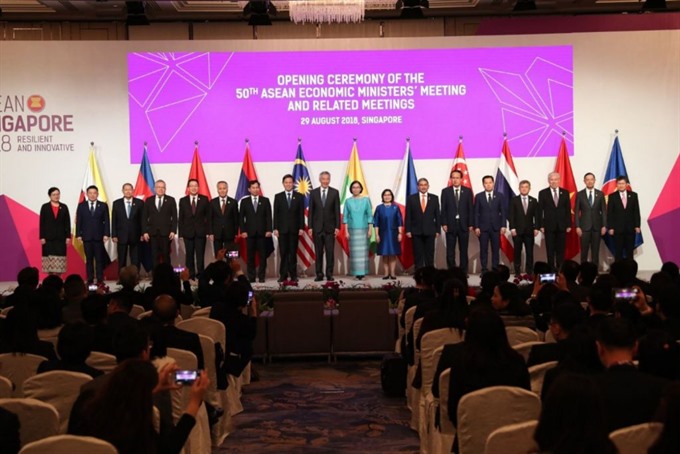 World
World

Talks on a major trade pact between ASEAN and six Asia-Pacific countries have reached a critical stage and could be "substantively concluded" soon, Prime Minister Lee Hsien Loong said on Wednesday.
 |
| Prime Minister Lee Hsien Loong and Trade and Industry Minister Chan Chun Sing pose for a photo with representatives from the Asean member states at the 50th Asean Economic Ministers’ Meeting, on Wednesday. — Photo The Straits Times/ANN |
SINGAPORE — Talks on a major trade pact between ASEAN and six Asia-Pacific countries have reached a critical stage and could be "substantively concluded" soon, Prime Minister Lee Hsien Loong said on Wednesday.
Asean member states have been pushing for the trade deal, the Regional Comprehensive Economic Partnership (RCEP), to be inked by the end of this year.
It would create the world’s largest trading bloc, covering a third of global gross domestic product.
Aside from the 10 Asean member states, the signatories are China, India, Australia, Japan, South Korea and New Zealand.
In opening remarks at the 50th Asean Economic Ministers’ Meeting on Wednesday, Mr Lee noted that Asean has "exerted significant effort" to make progress on the RCEP.
The four-day meeting at the Shangri-La Hotel ends on Saturday.
"The RCEP negotiations have continued for some time, and have now reached a critical stage. After a great deal of work, the possibility of substantively concluding the RCEP negotiations is finally in sight," Mr Lee said.
"I encourage RCEP countries to take a long-term view, keep up the momentum, engage constructively and with maximum flexibility, so that we can deliver a high quality RCEP Agreement this year."
Given the diversity of RCEP’s members, "we all have to make trade-offs and compromises", Mr Lee said.
He added: "But we should weigh these against the significant strategic and economic value of the RCEP."
The inking of the trade pact comes amid growing trade tensions between the United States and its major trading partners such as Canada, the European Union and China, making it all the more important that Asean strengthens its economic cooperation and integration, Mr Lee said.
"The rules-based multilateral trading system, which has underpinned Asean’s growth and prosperity, is under pressure," he said.
"At the same time, each Asean member state is subject to different pulls and pressures from bigger powers. In these circumstances, all the more members must stay united and strive to maintain our cohesion and effectiveness."
This includes pressing on with regional economic integration and fully implementing the Asean Economic Community Blueprint 2025, which will enable Asean businesses to operate more seamlessly across the region and make Asean companies and economies more competitive globally, Mr Lee said.
This would also help to fully realise Asean’s potential, he added.
Asean is forecast to become the fourth-largest economy in the world by 2030, after the US, China and the EU.
GDP growth has averaged 5.4 per cent in recent years, well above the global average, and is projected to grow around this rate for the next five years, Mr Lee noted.
In his welcome remarks, Trade and Industry Minister Chan Chun Sing noted that despite rising nationalistic tendencies and anti-trade sentiments elsewhere in the world, Asean has stayed the course in deepening regional economic integration.
Businesses and consumers in the region have already benefited from the realisation of the Asean Economic Community (AEC) in 2015, he noted. Intra-regional trade in goods is now largely tariff-free, non-tariff barriers have been progressively reduced, services regulations made less stringent and more transparent, and pro-business investment rules implemented.
Now, Asean leaders are working on several initiatives to further drive regional cooperation, in areas such as digital connectivity, customs clearance and tourism, he said.
The region should identify areas where individual economies can complement one another to compete beyond Asean and further facilitate trade, investment and people-to-people links, he added.
"We cannot afford to let recent policy U-turns elsewhere distract us from defending the very foundation that underpins the AEC and has benefited the region," Mr Chan said. — The Straits Times/ANN




